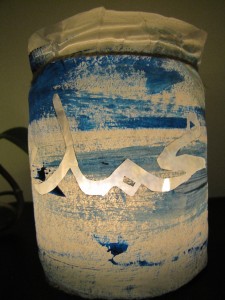On Prophetic Light
Reflection on Vernon James Schubel’s Religious Performance in Contemporary Islam: Shi’i Devotional Rituals in South Asia (Week 5)
Light has a special place in the human imagination of the divine. This is clearly demonstrated in the following verse of the Qur’an:
Allah is the Light of the heavens and the earth.
The parable of His Light is a niche wherein is a lamp—
the lamp is in a glass, the glass as it were a glittering star—lit from a blessed olive tree,
neither eastern nor westernwhose oil almost lights up,
though fire should not touch it.
Light upon light.
Allah guides to His Light whomever He wishes.
Allah draws parables for mankind,
and Allah has knowledge of all things.
Quran 24:35
I’d like to take a few moments to reflect upon this verse.
I appreciate the indiscriminate nature of the light as it is depicted here, giving the passage pluralistic appeal. I imagine light pouring out into the darkness and covering all that it comes across, regardless of race, gender, or creed.
I’m captivated by the notion of the lamp as a clear glass, as the verse states, “as it were a glittering star.” It saddens me that this strikes me as optimistic. I wish that God’s light or the light of truth and clarity was as clearly visible today as if it were to shine through a clear, glittering glass. However, I feel the morally murky waters of political agendas, spiritual and physical materialism, and fear, often prevent us from perceiving truth directly. For that reason, I’ve surrounded the lantern in translucent blue hues. The light of the divine is still visible, but it is not clear.
However, the light shines most directly through the word Muhammad. I designed this in light of (ha!) the Shi’i traditions notion of Divine Light, which is transmitted through the lineage of the prophet. Schuebl describes a unique Shi’i cosmology in which prophets were created before creation from a primordial light and that as a result, through their especially close relationship with God, they are endowed as “spiritual descendants” with “special abilities and powers” (32). I’m intrigued by several notions of this cosmology, predominantly the predestined nature of the close relationship that Muhammad’s spiritual descendants are able to achieve with regard to the divine, but also because of the emphasis on ancestry and the process of passing down sacred wisdom. While I have a hard time relating to the former, I think the latter is something I could pay closer attention to in my daily life and in familial relationships as a means for seeing the Divine Light more clearly, despite the clouded lantern.
